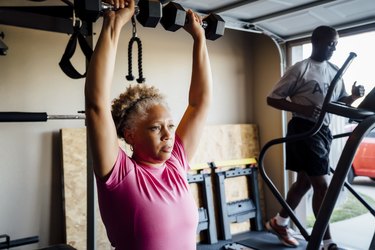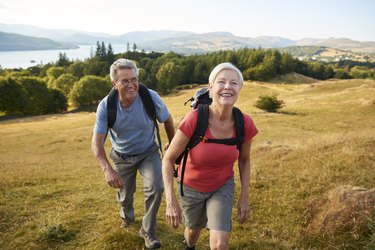
The novel coronavirus has upended all of our lives, making healthy habits harder than ever to maintain thanks to reduced access to many of the pillars of wellbeing: fresh food, the gym and spending time with family and friends.
Older adults are particularly prone to the detrimental health effects of being housebound. Because your body loses function as you age, a poor diet, lack of exercise and loneliness can hit you harder than younger, more resilient folks.
Video of the Day
Video of the Day
The good news? By making some creative shifts to everyday routines, you can thrive while holed up at home. Here's how.
Get tips on how to stay healthy, safe and sane during the novel coronavirus pandemic.
1. Eat Three Meals a Day, and Stack Them With Healthy Foods
Especially when they're socially isolated, one of the biggest challenges for older Americans is keeping on pounds.
"As you age, your metabolism slows and you may be less active, which decreases the number of calories burned during the day," Louise Aronson, MD, professor of geriatrics at the University of California San Francisco and author of Elderhood, tells LIVESTRONG.com.
As a result, you're probably consuming a smaller amount of food. Cathleen Colon-Emeric, MD, chair of the division of geriatrics at Duke University, points out that seniors often chow down just twice a day. Yet you still have the same nutritional needs you did when you were younger and ate more.
Unintentional weight loss occurs in 15 to 20 percent of adults over 65 and can lead to a decline in health and vitality, according to May 2014 research in American Family Physician.
"Weight loss has a deficient effect on your immune system — your immune cells won't function as well," Dr. Colon-Emeric says. "It also has a negative impact on muscle mass and bone density."
Weak muscles impair your balance, increasing the risk of falls, while fragile bones make you susceptible to fractures.
To prevent an unwanted slim-down, have three balanced meals daily.
"Eating your colors helps you get in the vitamins, minerals and micronutrients that support your immune system," Dr. Aronson says, suggesting a plant-based diet full of veggies and fruits.
(And if you have overweight and are beginning to diet, make sure to shed pounds slowly, carefully and under the guidance of your doctor or nutritionist.)
Because getting fresh food can be challenging these days, cut back on grocery runs by stocking your freezer. A June 2017 study in the Journal of Food Composition and Analysis found that the nutritional value of frozen produce was equal to or greater than fresh produce.
Tip
Canned fruits and veggies can be healthy, too, as long as you avoid those with added sugar or salt.
On a limited budget? It can be tempting to turn to cheap, processed foods and then supplement with a vitamin.
"But there is a lot of science supporting that eating your vitamins is different than taking a vitamin," Dr. Aronson says. "Often, vitamin supplements either do nothing or cause harm."
So make sure the calories you consume are nutritious. In addition to fruits and vegetables, fill your plate with whole grains and heart-healthy omega-3 fatty acids — great sources with a long shelf life include canned fish (think: salmon, tuna, sardines) as well as flaxseeds, chia seeds and walnuts, according to the Cleveland Clinic.
(Psst: Looking for food assistance programs? Check the USDA website for options.)
Pay particular attention to protein and aim to incorporate lean sources like eggs, fish, chicken and legumes into every meal (canned beans are an inexpensive, easy go-to).
Protein is crucial for maintaining muscle mass, strength and function in older adults, according to a study published December 2014 in Clinical Nutrition.The researchers recommend consuming 1 to 1.5 grams of protein for each kilogram of body weight daily (or about 1 gram for every 2 pounds that you weigh), ideally spread throughout the day.
To put that into perspective, a 150-pound person should aim to get about 75 grams of protein daily.
"Try a yogurt smoothie with breakfast or a glass of milk as a bedtime snack," Dr. Colon-Emeric suggests.
2. Get Moving

Another strategy to mitigate the loss of muscle mass and bone density — not to mention boost your mood and improve sleep (more on that later) — is regular weight-bearing exercise. According to the Physical Activity Guidelines for Americans, older adults should workout for 30 minutes a day five days a week, including twice-weekly strength-training.
If that feels unattainable: "Any physical activity is better than nothing, so work your way up," Dr. Colon-Emeric says. "Keep in mind that you can split it up — say, by exercising twice a day for 15 minutes, instead of 30 minutes all at once."
Or simply try to work more movement into your day. "Walk up and down the hall when you're on the phone, or repeatedly stand up and sit down during commercial breaks," Dr. Aronson suggests.
Dr. Aronson urges seniors to integrate four types of exercise:
- Stretching to prevent injury (which can lead to visits to the clinic or hospital, where you're at greater risk of contracting the novel coronavirus)
- Balance to decrease your risk of falling
- Resistance training to build muscle, mitigate joint pain and counteract bone loss
- Aerobic exercise (think: walking, swimming) for your heart and lungs
If you're tech-savvy, check out the National Institute on Aging's Go4Life program, which provides free online videos, exercise guides and goal-setting tools. You can do everything safely at home with no special equipment.
Another great resource is SilverSneakers, a free Medicare benefit that typically offers in-gym exercise programs, but during the pandemic has rolled out an array of resources, including on-demand fitness videos and live Facebook classes.
"Many senior centers and gyms are also providing online classes," Dr. Aronson says. "Try phoning a friend to take a class together, and make it a social activity."
Creating a schedule can help you stick to your goals. "Do aerobic exercise in the morning when you have more energy, stretch for 10 minutes at lunchtime, and at the end of the day lift weights — you can simply use bags of rice, cans of beans or water bottles," Dr. Aronson says. "Or push against the furniture and walls to use your body weight as resistance."
Related Reading
3. Connect With Your Health Care Team

If it's a challenge to leave the house for in-person doctor visits, try telemedicine, which has become more accessible in the age of COVID (Medicare has expanded its telehealth coverage, for example).
It might feel foreign to have a virtual appointment with your MD, but "a silver lining is that older adults don't have to deal with the hassle of transportation to the office," Dr. Colon-Emeric says. "Plus, physicians have a chance to see folks functioning in their natural environment."
"It's essential to maintain chronic conditions like diabetes and high blood pressure so you don't end up in the hospital where you could be exposed to COVID."
Ask your provider about converting your planned visits to telemedicine — and don't let appointments slide.
"It's essential to maintain chronic conditions like diabetes and high blood pressure so you don't end up in the hospital" where you could be exposed to other illnesses, Dr. Colon-Emeric says.
Plan to log onto your doctor's portal 15 minutes before the appointed time. "That way, you can call the office if you're having trouble," Dr. Aronson says.
4. Stay in Touch
Social interaction is an essential ingredient to seniors' wellbeing and is linked to a lower risk of many serious health conditions, including Alzheimer's, osteoporosis, heart disease and cancer, according to the National Institute on Aging.
Dr. Colon-Emeric suggests the following:
- Set up regularly scheduled video chats with family members
- Play online interactive games with friends (think: Words with Friends, backgammon, bridge or chess)
- Tune into virtual services, prayer groups or Bible studies offered by your place of worship
- Host a Zoom dinner party where you sit down to a meal with your loved ones on-screen
But what if you're among the one-third of older adults who don't feel confident using tech, according to a 2017 study from the Pew Research Center?
"Ask a friend or family member to walk you through the process of getting set up," Dr. Aronson says. "You can learn to use technology at any age, and it's really fun."
Until then, you can call into Zoom events using your phone instead of a computer, or dial a buddy to watch the same TV show or movie together over the phone. For example: Arrange a standing call with your best friend every Sunday at 5:00 p.m. to tune into Top Chef.
5. Engage Your Brain

Participating in mentally stimulating activities later in life (think: computer use, crafts and games) decreases your risk of cognitive decline, according to a March 2017 study in JAMA.
Carve out time for intellect-boosting play — this is the perfect moment to break out jigsaw puzzles, crosswords, board games or a deck of cards.
Or get started on a new project. Some ideas:
- Woodworking
- Gardening
- Embroidery
- Home improvements
- Organizing your pantry
- Recording your family history
"Set a timer to limit how long you spend listening to the news."
6. Give Back
Volunteerism is linked to longevity in older adults, according to a February 2020 study in Personality and Individual Differences.
"Folks need to feel like they are helping others in addition to receiving assistance themselves," Dr. Colon-Emeric says.
If you can't lend a hand in person, "pick up the phone and call people who attend your church to check on them," Dr. Colon-Emeric says. "Or order meals for the staff at a local hospital, nursing home or grocery store."
If you're crafty, sew cloth face masks for essential workers or neighbors, make photo albums for family and friends or write thoughtful letters or emails to loved ones.
7. Find Your Zen

Older adults tend to have more trouble coping with stress, according to Harvard Health Publishing, so make relaxation a priority.
"Set a timer to limit how long you spend listening to the news." Dr. Colon-Emeric says.
When it goes off, head outside. People who spend at least two hours in nature a week are happier and healthier than those who don't, according to a June 2019 study in Scientific Reports.
Dr. Colon-Emeric also recommends the Three Good Things exercise, which a March 2017 study in [Health Psychology](https://www.researchgate.net/publication/313845439)_ affirmed promotes physical and emotional wellbeing: "Every day, write down three things that made you happy in your life or the world, no matter how simple," she says.
Related Reading
8. Log Enough Pillow Time
Shut-eye tends to become more elusive with age, according to the National Sleep Foundation.
"Your circadian rhythm — the internal clock you're born with — isn't as effective at telling you when to sleep and wake," Dr. Aronson says. "Because deep sleep doesn't happen as often, you may not feel rested in the morning."
Although seniors often need extra zzzs, only nap if it doesn't interrupt your nighttime sleep.
Other things that can help: exercise, a healthy diet and a consistent sleep schedule.
"It's also important to get out of bed during the day," Dr. Aronson says. "That way, your body will associate your bed with sleeping, rather than watching TV, reading or talking on the phone."
Read more stories to help you navigate the novel coronavirus pandemic:
- Clinical Nutrition: "Protein intake and exercise for optimal muscle function with aging: recommendations from the ESPEN Expert Group."
- Journal of Food Composition and Analysis: "Selected nutrient analyses of fresh, fresh-stored, and frozen fruits and vegetables"
- American Family Physician: "Unintentional Weight Loss in Older Adults"
- Personality and Individual Differences: "Which types of giving are associated with reduced mortality risk among older adults?"
- JAMA: "Association Between Mentally Stimulating Activities in Late Life and the Outcome of Incident Mild Cognitive Impairment, With an Analysis of the APOE ε4 Genotype"
- Health Psychology: "'The Three Good Things' – The effects of gratitude practice on wellbeing: A randomised controlled trial"
- Pew Research Center: "Barriers to adoption and attitudes towards technology"
- Cleveland Clinic: "Plant Sources of Omega-3s"
- U.S. Department of Health & Human Services: "Physical Activity Guidelines for Americans"
- National Institute on Aging: "Research Suggests a Positive Correlation between Social Interaction and Health"
- Centers for Disease Control and Prevention: "Using Telehealth to Expand Access to Essential Health Services during the COVID-19 Pandemic"
- American Psychiatry Association: "New Poll: COVID-19 Impacting Mental Well-Being: Americans Feeling Anxious, Especially for Loved Ones; Older Adults are Less Anxious"
- Harvard Health Publishing: "How stress affects seniors, and how to manage it"
- Scientific Reports: "Spending at least 120 minutes a week in nature is associated with good health and wellbeing"
- National Sleep Foundation: "Aging & Sleep Information"
- JAMA: "Food Safety and COVID-19"
- Centers for Disease Control and Prevention: "Coronavirus Disease 2019 (COVID-19): How to Protect Yourself & Others"
- Centers for Disease Control and Prevention: "Coronavirus Disease 2019 Case Surveillance — United States, January 22–May 30, 2020"
Is this an emergency? If you are experiencing serious medical symptoms, please see the National Library of Medicine’s list of signs you need emergency medical attention or call 911.